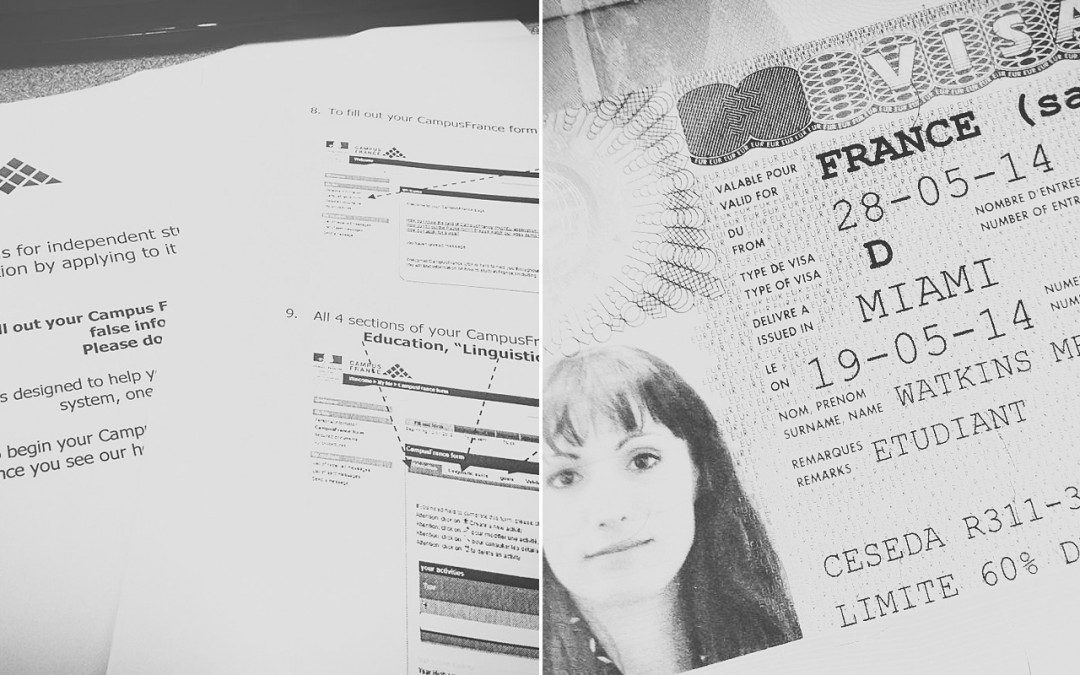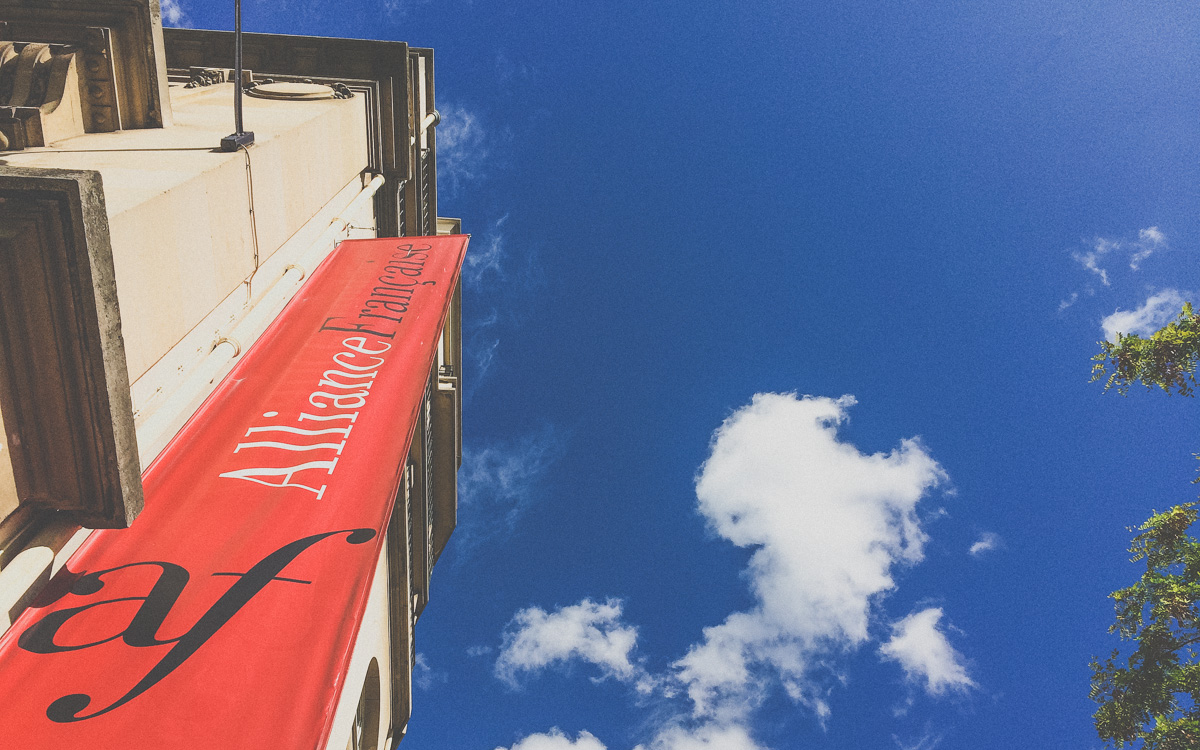Becoming an Expat in France: The Visa
The first step to becoming an immigrant and moving abroad is figuring out how you will legally stay in the country. Depending on the country, this may be more simple than others (and also more expensive than others). In my life I have obtained visas for three different countries, in which one was for long-term stay(s). Also, my Indian and Russian visas were pre 9/11, but at the time it was a simple application + fee. Getting long-stay visa is a COMPLETELY different experience. My number one piece of advice: have accurate expectations of the process. It will likely be a difficult, convoluted, frustrating process. Just expect it. Know what you are signing up for. Then, when you hit the road blocks, you won’t be disenchanted or be tempted to throw in the towel. And, if everything goes smoothly, you can relish in the fact that you had la chance!
My number one piece of advice: have accurate expectations of the process. It will likely be a difficult, convoluted, frustrating process. Just expect it. Know what you are signing up for. Then, when you hit the road blocks, you won’t be disenchanted or be tempted to throw in the towel. And, if everything goes smoothly, you can relish in the fact that you had la chance!
The Types of Visas
For France, there are many options. Basically, you can marry, study, work or be rich. You can watch a much more detailed explication of all of the options, and which ones allow you to work, with a video from Paris Unravelled. But in short, the easiest are to buy it, marry it or study it. Of course, these all have huge implications!
- If you are very wealthy, you can prove that you do not need to work to support yourself and that you won’t pose any drain on the French system.
- If you have a French partner and plan to marry—much less have a baby—it does make everything easier. I would never tell someone to marry for a visa, but hey, if that is your situation, congrats! It still doesn’t give you immediate citizenship, but generally, you will have all of the same rights as a French person and will eventually (in 3-5 years, depending on the situation) have access to the citizenship application process.
- The next easiest is to become a student. Being a student in France can look very different depending on your situation and chosen studies. But in all cases, you must attend classes 20 hours a week for the majority of the duration of your visa.
- Otherwise, you will need some form of work visa, which is significantly harder to qualify for and obtain. Not impossible, but not easy.
Getting a Student Visa
So here I’ll talk about the process to obtain a student visa or visa étudiant. When I pass to another type of visa down the road, I’ll write a separate post about that as the process is very different for each type.
Remember what I said earlier? Remember it often and well: have accurate expectations. The process is somewhere between complicated and down-right crummy. Just expect it. You’ve gotta want this to make it to the other side, but when you do, I can tell you it is WORTH EVERY. STINKIN’. MOMENT.
Chose your School and Program or Degree
OK, so you will first need to figure out what kind of student you are going to be: where and what are you going to study? You have a range of options here, from private language schools to bachelors or masters programs. If you have no or a low-level of French, you will probably find yourself looking into language programs. There are many to choose from, some of which include the Alliance Française (which I attend), the Sorbonne’s Cours de Civilisation Française, and Accord. In the past, the Diplôme Universitaire de Langue Française (DULF) program through the Sorbonne was only available to advanced-level speakers (B2+), but is now open to beginners. This program is a bit less expensive, albeit possibly more rigid, than the other offerings. Remember, if you are going to be on a student visa, you must choose a course load of at least 20 hours a week or you will not qualify for your visa. I have never seen an OFFICIAL number for the percentage or number of weeks you need to be in classes, but I have always taken the approach of more or less following the University schedule and haven’t had any problems. During my first 52 weeks in the country, I was in class for about 40 of them. Aside from language programs, you can research all other types of degrees and programs available over at Campus France, which is also where you will officially begin your application process.
Start your Application with Campus France
Once you have made your game-plan, you will need to create your profile and begin the application process with Campus France. I recommend VERY STRONGLY that you start this 90 days before your target departure. You can’t start it any sooner than that, but I suggest you start it as soon as you are allowed. For some reason completely unbeknownst to me, Campus France will HOLD your application before even REVIEWING IT for three weeks. They just sit on it. I guess this is your first “because France” bureaucracy experience. Anyway, once they finish sitting on your application (which may also take you a week or two to fill out and gather all of your necessary documents), you will schedule a phone interview where they will ask you questions about your reasons and goals for studies. It was relatively painless for me. After this phone call, they will validate your file which will allow you to schedule your appointment with your French Consulate. Technically, you cannot schedule your appointment until you have received the green-light from Campus France. Road blocks.
This is where I got stuck. I didn’t follow the advice of starting 3 months ahead and I started 2 months ahead. I thought that was enough time, but didn’t realize that Campus France was going to sit on my file for those three weeks. Once I had my phone interview, it took them another week-ish to get my approval back to me. Meanwhile, the consulate appointments must be scheduled several weeks in advance (depending on your location) and THEN you need to leave two weeks of processing time after your consulate appointment to get your visa in hand. It all adds up and you NEED those three months if you don’t want to have a pre-departure panic. Do yourself the favor.
Since I didn’t do myself that favor, I did find myself in a bit of a crisis. I found out that I could actually schedule my appointment before I had my approved file back from Campus France, even though this is technically forbidden (I say this incase someone is in freak-out mode right now—it saved me). Even so, I had my appointment scheduled and hotel room booked and still no approval file. Campus France allows you to urgently contact them if your appointment is approaching and you still haven’t received your documents. I followed these steps and was told my file would be expedited. Still nothing. I actually contacted my local congressman and he had his aides get involved and advocate on my behalf to Campus France. I was very pleasantly surprised how they jumped in, even though they told me they had no jurisdiction over Campus France and may not have any pull or influence. That said, they tried and I think it helped.
Go In-Person to your Local French Consulate
I had my hotel booked in Miami for the night before my appointment. Luckily I booked a hotel with a business center with printers because when I left for my visa appointment and drove the 4 hours to Miami, I STILL didn’t have my file from Campus France (and technically still didn’t even have the right to even schedule my appointment, meaning I needed at least another MONTH to be able to get to France … that month that I cut out of the timeline by starting 2 months ahead instead of 3). Anyway, with lots of urgent phone calls and emails, I received my approval letter from Campus France to complete my dossier literally 3o minutes before leaving the hotel and heading to the consulate. Finally, I got the email, logged into my account and clicked print. But, of course, the hotel computer didn’t print the file. Road blocks. Back to my hotel room I went, took a screenshot of the document, mailed it to myself and printed the image. Success!
You MUST apply for your visa in your home country and you MUST appear in-person at the consulate. If you are already in your target country and want to apply for a student visa, you need to go home for that. Likewise, there are some limitations related to passing from one “higher” type of visa “down” to a student visa, so be aware of that. You can either pick up your visa in-person when it is ready or you can give them a priority mail prepaid envelope and receive it by mail. Since I didn’t want to spend 8 hours driving to get my visa right before moving to France, I opted for the over-night mail option. I got my visa 8 days later (allow up to two weeks for processing)—8 days before leaving—but really only with a few days to spare as the Memorial Day holiday took up three of them.
OFII – L’Office Français de l’Immigration et de l’Intégration
When at your appointment, they will give you an OFII form. Don’t forget to pack it and don’t lose it (like I did) once you are in-country. You will need to mail it in and about 6 weeks later you will have to appear for a medical evaluation which will officially allow them to validate your visa with a stamp. This will serve as your first carte de séjour. Without your OFII stamp, you do NOT have a valid visa to stay in the country longer than a tourist.
The Plan and Timeline
- 9-6 months before: Decide upon your school and program. You will need to apply for and be pre-registered for your classes before you move on. Make sure this part is completed more than 90 days before your target departure date. (For Alliance Française, it took about 1 week to get registered and my necessary documents to proceed.)
- 3 months before: Start your application at Campus France
- 3-4 weeks later: Campus France phone interview
- 1 week later: Approval letter from Campus France and schedule Visa Appointment at local consulate
- 2-4 weeks later: Visa Appt
- 2 weeks later: Receive visa
If you use the outside estimates on each step, you will come to 11 weeks with NO breaks or downtime between moving to the next step. You NEED 90 days to not go crazy. Trust me.
Complicated? Yep. Road blocks? Yep. Is it worth it? Yep!
Have any questions about the process that I didn’t address here? Feel free to drop me a line or contact me!








No Comments